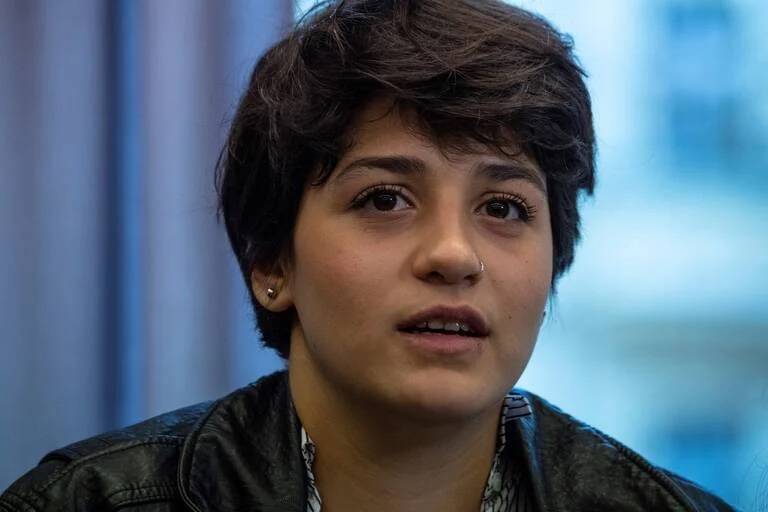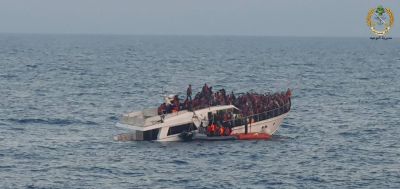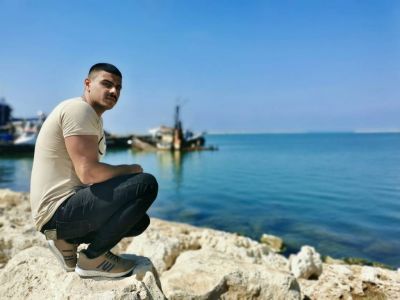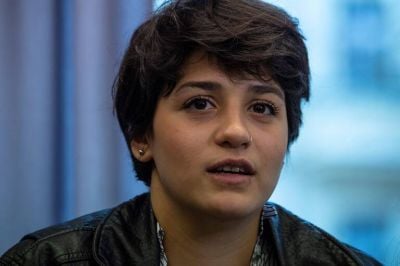
Former Syrian swimmer and human rights defender Sarah Mardini, in Berlin in Dec. 2018. (Credit: John MacDougal/AFP)
For three and a half hours, she swam across the Mediterranean Sea to the Greek island of Lesbos with her sister Yusra Mardini and two men who knew how to swim, pulling an inflatable boat whose engine had broken down.
They saved the lives of the 14 other passengers who, like them, were seeking asylum in Europe.
It was in 2015 that the heroic act of the two Syrian swimmer sisters moved the world. Their story was made into a movie that Netflix released in November 2022.
Marked for life by this experience, in 2016, Sarah Mardini joined the Emergency Response Center International (ERCI) in Lesbos, to participate in search and rescue missions for migrant boats in distress.
While her unwavering solidarity with migrants has gained her the admiration of many, it has also been the cause of a long series of legal setbacks in Greece that have put her life on hold.
Four years after having spent 106 days in pre-trial detention, Mardini’s trial resumed on Jan. 10, before the court of Mytilene, Lesbos, along with 23 other humanitarians accused of espionage and fraud — two offenses for which the defendants face up to eight years in prison.
The trial, which began in November 2021 and was immediately adjourned, finally resumed with the lawyers making their pleas but immediately adjourned again until Friday.
The court’s president said that only charges of “espionage” would be examined.
In another judicial investigation that has not yet led to an indictment, Mardini and her associates are accused of migrant smuggling, taking part in a criminal organization and money laundering — three crimes that are each punishable by five to 10 years in prison.
A ‘grotesque’ trial
According to a European Parliament report published in June 2021, this is “the biggest case of criminalization of solidarity in Europe.”
It is a “grotesque” trial, according to Amnesty International. It is “undermined by procedural flaws that undermine the right to a fair trial,” according to Human Rights Watch (HRW).
HRW cited the absence of the trial summons page, which some defendants have not even received. The defendants are also named by numbers from 1 to 24, making it impossible to know for what crimes each one is accused.
For Sarah Mardini and her colleagues, the nightmare began in February 2018, when they were summoned by the police along with Sean Binder, a German ERCI volunteer.
Their phones and computers were confiscated, and they were kept in police custody for two days.
“At the time, they took it lightly,” Madi Williamson, a member of the Free Humanitarians campaign created by relatives of the defendants, told L’Orient-Le Jour.
But this was the beginning of what Williamson, a nurse involved in humanitarian work, describes as “judicial harassment” on part of the Greek authorities to “dissuade” any support for migrants at Europe’s borders.
A few months later, Sarah Mardini, then 23 years old, was about to fly from Lesbos to Germany to continue her studies at Bard College in Berlin when she was arrested and placed in custody.
This was when everything changed.
Sarah Mardini — who along with her sister received the “Unsung Heroes” award at the Bambi Awards in Germany, where they had obtained refugee status — was indicted in Greece on five serious charges, ranging from espionage to being part of a criminal organization trafficking in migrants.
Binder, who came to visit her in detention, was also imprisoned.
Then came the turn of Nassos Karakitsos, a Greek employee of ERCI, and Panos Moraitis, who founded the NGO in 2015.
A week after their arrest, Greek police issued a statement saying they were part of an “organized migrant smuggling network” consisting of six Greek citizens and 24 foreigners from different organizations.
Shortly after, ERCI, which also provided health care and education to migrants on Lesbos, halted its activities.
The four humanitarians spent more than 100 days behind bars before being released on bail.
The Mardinis spent two months in solitary confinement and, upon release from prison, received numerous death threats.
Ironically, “they were remanded in custody for fear they would not attend their trial,” Willamson said. “But when the trial was finally set for Nov. 18, 2021, Sarah, after her return to Germany, was denied entry to Greece to appear before court, under the pretext that she represented a threat to national security,” Williamson explained.
The young Syrian woman could not go to the court of Mytilene to defend herself on Jan. 10.
Charges contrary to Greek law
The basis for the accusation is at best flimsy, at worst contrary to Greek law, according to HRW, which calls on the judiciary to acquit the defendants.
For example, the charge of migrant smuggling is based on Law 4251 passed in 2014. But Article 2 of the same law excludes people assisting asylum seekers and people in distress from criminal prosecution.
In addition, both Mardini and Binder are accused of facilitating the passage of migrants to Greece on 11 occasions. The German volunteer was studying in London on at least six of these occasions, while the Syrian ex-swimmer was studying at Bard College in Berlin at these times.
In addition to these incongruities, there are accusations of espionage, which are based on “the fact that the humanitarians were exchanging [messages] on WhatsApp, an encrypted messaging platform,” Williamson said.
At the opening of the trial in November, Mary Lawlor, UN special rapporteur on the situation of human rights defenders, warned that if the defendants were found guilty, this would set “a dangerous precedent.”
In the meantime, legal cases against aid workers have multiplied in Greece, which has been accused of illegally turning back migrants by many NGOs, media and European institutions.
Williamson is also one of a group of 10 aid workers prosecuted by the Greek justice system since July 2021.
“Will I continue to do my work, knowing that I can be arrested and indicted, even if I have done nothing wrong?” Williamson asked.
Beyond Greece, 180 people involved in 13 different NGOs are currently facing legal proceedings across Europe in relation to assisting illegal migrants, according to Free Humanitarians.
This article was originally published in French in L'Orient-Le Jour. Translation by Sahar Ghoussoub.


